-
Why Having Enough Trash Cans Matters for Your Business
When you set up a waste management plan for your business, you will need to make sure that your facilities are equipped with enough trash cans. While trash cans may seem like basic office supplies, they are actually very important to ensuring proper waste disposal for your business. A company that offers waste disposal services and trash pickup near Atlanta will be able to help you calculate the correct number of trash cans for your office space.
By providing your workers with enough trash cans, you will be able to ensure that your trash removal efforts are being supported, throughout the workday. When your employees are provided with conveniently placed trash cans, they will be able to easily toss out their waste. However, if you place too many trash cans around your business, you may end up crowding your space. A team of waste management experts can help you to make sure that your business is supplied with the correct number of trash cans.
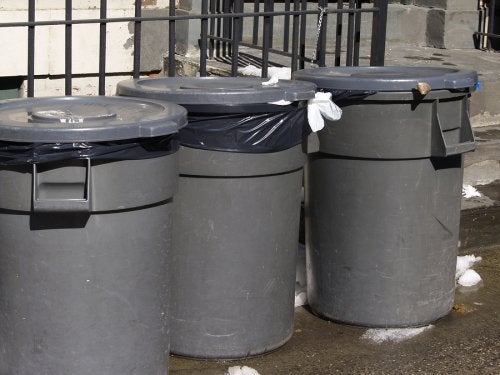
-
Spotlight on Our Equipment Maintenance Services
If your business uses waste management equipment, be sure to trust Southern Waste and Recycling for all of your maintenance and service needs. We proudly offer a range of services and repairs for balers, compacters, and other waste management tools. Whether you are in need of a dumpster in Atlanta, or you are seeking emergency repairs for your trash compactor, we will provide you with prompt and efficient services.
To ensure that your compactor or baler remains up and running for all of your daily operations, consider signing up for our preventative maintenance program. When you rely on our company for preventative repairs, you can rest assured that your waste management equipment will remain up and running at all times. In the event of an emergency, we will also be on call to provide you with immediate repairs. Our trash service company is committed to the satisfaction of our customers, and we will restore your equipment to functional condition as quickly as possible.
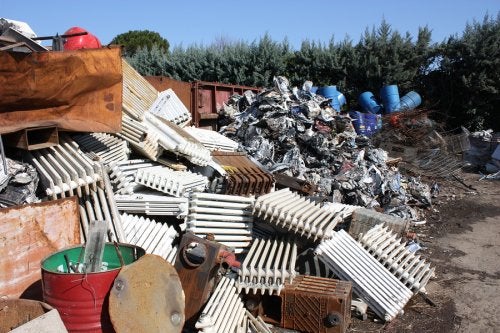
-
Understanding LEED Construction Waste Management Requirements
When you are seeking LEED certification for your next building project, make sure to read up on the construction waste management requirements that are included as a part of the LEED program. In order to qualify for LEED certification, a contractor must recycle a certain percentage of waste that is generated during the building process. By scheduling trash pickup and recycling serving Atlanta, you can make sure that your waste management protocol is in accordance with LEED certifications. Let’s take a look at some LEED construction waste management requirements that you may want to keep in mind for your next jobsite.

Identify Sources of Construction Waste
The first step of creating a construction waste management plan that follows LEED guidelines is to identify the site’s main sources of waste. Some examples of construction waste include cardboard, scrap metal, and excess timber. Once these waste sources have been identified, the team of contractors can create a sustainable recycling plan for the construction site.
Exclude Materials That Do Not Qualify
Under LEED guidelines, there are certain types of waste materials that do not qualify for the program. Materials that cannot be recycled or reused in order to qualify for LEED credits include soil or materials that have been unearthed during the land clearing process. While these materials should be disposed of in an environmentally friendly manner, they cannot be counted towards a construction site’s total amount of recycled or salvaged materials.
Calculate Construction and Demolition Material Streams
LEED guidelines state that construction sites must divert a minimum of fifty percent of their construction or demolition materials to recycling facilities. If your site will be relying on a three-stream recycling protocol, you must recycle 50 percent of your total construction materials. Sites that rely on four-stream recycling protocols are required to recycle at least 75 percent of their total waste. By providing the U.S. Green Building Council with documentation of your green waste management efforts, you will gain points towards your building’s eventual LEED certification.
-
Examining the Impact of Recycling
Recycling a single water bottle can have a major impact on the health of the planet. In this video from Seeker, you will take a look at the importance of recycling around the globe. When plastic bottles are sent to a recycling center serving Atlanta , they can be processed and reused to create new items. By contrast, a plastic bottle that is tossed in the trash will never biodegrade, and will, instead, take up space in the landfill.
After you have learned some essential recycling facts, you may be tempted to recycle at your home or business. With services from a qualified waste management company, you will be able to set up an effective and simple recycling program that helps you to reduce, reuse, and recycle your materials.
-
Factors to Consider When Building Your Industrial Waste Management Plan
Many industrial processes produce high volumes of waste, some of which can be hazardous to humans and the environment. Therefore, you will need to work with a waste management company to schedule routine trash pickup and industrial waste removal . With services from a company that offers waste management and recycling serving Atlanta, you can rest assured that your industrial waste is being disposed of in a safe and effective manner. Read on for a closer look at three factors to consider when you are building your industrial waste management plan.
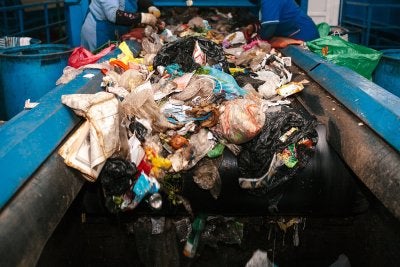
Waste Collection Methods
One of the most critical considerations for any industrial waste management plan is how the trash debris will be collected at the site. To achieve the best efficiency from your waste management plan, you should attempt to collect waste as soon as it is generated in your factory or plant. By strategically placing trash cans, recycling containers, and other receptacles around your site, you will be able to ensure that waste is collected soon after it is created.
Employee Training Protocols
An industrial waste management plan will only be as effective as the employees who are implementing the program. Without proper training and education, your workers may not know how to properly use your new trash receptacles or recycling bins. After you have planned out your industrial waste management scheme, take the time to correctly educate your employees on how to properly dispose of waste.
Trash Pickup Schedules
A final consideration for your industrial waste management plan is your trash pickup schedule. If your industrial facility generates large volumes of waste, you may need to schedule pickups for routine intervals throughout the week. A company that specializes in waste management services will be able to help you create a trash removal schedule that reduces waste on your site and prevents the unnecessary buildup of trash or recyclables. Your trash pickup schedule will need to be customized to the unique needs of your facility.
-
Spotlight on Hazardous Waste Regulations for Academic Laboratories
Scientific inquiry is a cornerstone of academic study at the undergraduate and graduate levels. As the operator of an academic laboratory, it is essential that you set up safe and sustainable waste management services for your facility. With services from a company that specializes in waste near Atlanta , you can schedule secure trash pickup services for the hazardous waste that is generated by your lab.
Since academic labs create unique and varied amounts of hazardous waste, they are provided with some flexibility around scheduling their hazardous waste pickups. Depending on the size of your facility, you may be designated as a large, small, or very small quantity generator. At any designation, a hazardous waste generator must create a hazardous waste management plan that follows EPA guidelines. These guidelines state that hazardous laboratory waste must be removed from the site at least once every six months. All hazardous waste management plans should be authorized by lab managers or other trained professionals.
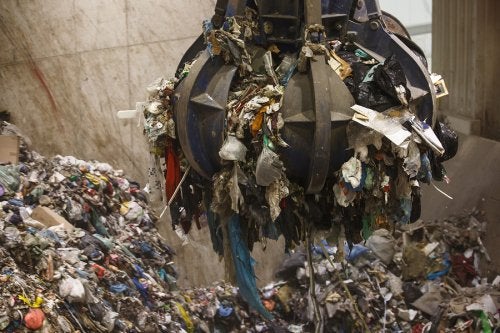
-
Waste Reduction Tips for Office Buildings
Over the course of an average workweek, your office building may generate considerable amounts of solid waste. Some examples of common office building waste products include litter, paper products, and electronic goods. By encouraging your employees to recycle and scheduling weekly trash pickup services, you can cut back on the waste that your office building sends to the landfill. A company that offers waste management services can help you create a targeted plan that will help you cut back on your office waste near Atlanta. Read on for an overview of some helpful waste reduction tips to implement in your office building.
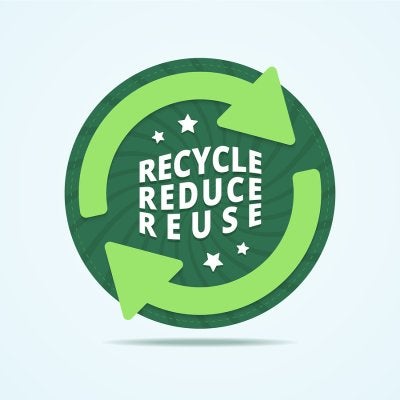
Encourage Electronic Communication
In today’s digital era, many forms of business communication can be completed online or over the phone. In order to reduce waste in your office building, you may want to encourage your workers to rely on electronic forms of communication, rather than printed memos and faxes. By cutting back on the number of paper letters and memos that you print out every day, you can achieve terrific waste reduction over the course of a business year.
Maintain Your Office Supplies
Office supplies, such as staplers, pens, and glue sticks, will all take up space when they are tossed in the trash and sent to the landfill. To cut back on the waste that is created by your office, you may want to encourage your workers to take care of their office supplies. Capping pens, avoiding stapler jams, and closing up glue containers will help these supplies last longer before they have to be tossed.
Create a Recycling Program
Recycling is one of the best ways to reduce office waste and help the environment. When you create a new recycling program for your business, you will need to make sure that all of your workers are on board with the plan. Along with placing recycling bins throughout your office space, you may want to hold a meeting where you discuss the importance of recycling. Creating recycling incentives and rewards can also help to encourage your workers to recycle.
-
Identifying Sources of Hazardous Waste in Your Small Business
Hazardous waste may be an unexpected byproduct of your business operations. Whether you are setting up a new small business, or you have been operating for years, it is important that you identify any hazardous waste that you may generate during your workdays. A company that specializes in waste near Atlanta will be able to help you create a waste disposal plan that allows you to handle these materials correctly.
To ensure that your waste management methods are EPA-compliant, you will need to assess and identify any hazardous waste that is created by your business. Hazardous waste is defined as any type of solid waste that is ignitable, corrosive, reactive, or otherwise toxic. For your reference, the EPA has created a list of more than 400 types of hazardous waste as defined by the Resource Conservation and Recovery Act. By consulting with this list, you will be able to easily determine whether your business creates hazardous waste. After your hazardous waste has been identified, you will be able to create a hazardous waste management plan.
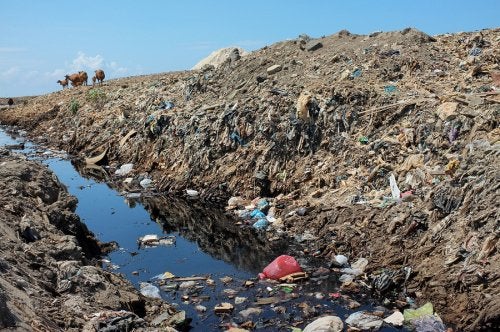
-
Steps for Recycling Industrial Hazardous Waste
Recycling hazardous waste is an important part of industrial waste management that helps conserve resources and save on manufacturing costs. If you are interested in recycling industrial hazardous waste near Atlanta, then you can benefit from becoming familiar with the following steps:
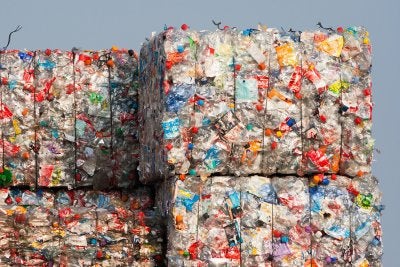
Determine Waste Regulations
The first step in properly recycling hazardous waste is to learn about the EPA waste disposal regulations for the material that you are working with. Refer to the EPA’s regulatory definitions to determine what category your waste material falls under.
Consider Cost-Accounting
You will find that there are many cost-accounting tools available to companies. These tools can help you track your company’s resource use and improve its resource efficiency. Cost-accounting tools usually consider factors like recycling activities, pollution prevention measures, energy savings, and the reduction of greenhouse gas emissions.
Choose a Facility
Once you are ready to begin the industrial waste recycling process, the next step is to locate a responsible recycler. The recycling facility should have a history of permit and environmental compliance, be financially sound, and employ responsible waste management practices. Also, learn if the facility has adequate pollution liability insurance, provisions for any potential closure and cleanup costs, and an effective drop-off and tracking protocol.
Confirm Recycling Legitimacy
Ensuring that your industrial hazardous waste will be properly handled is an important part of the recycling process. You should confirm that the recycling company is legitimate and has well-maintained records of recycling transactions. Also, determine if the secondary material can be effectively used as claimed and if it is being used in amounts more than necessary.
Track Recycling Progress
You have 2 good reasons to measure your success when it comes to recycling industrial hazardous waste. First, monitoring and reporting your company’s recycling progress can have a beneficial impact on its public image. Second, keeping track of your recycling performance provides you with information to share with stakeholders and investors to demonstrate your company’s adherence to environmental regulations.
-
Exploring the Life Cycle of Electronics
Electronics play a critical role in the daily life of the average American. If you’re like many people who recycle near Atlanta, then you may have questions about the process of electronics or e-waste recycling. Read on for some insight into the life cycle of electronics and why your used devices should be recycled and not tossed into dumpsters.
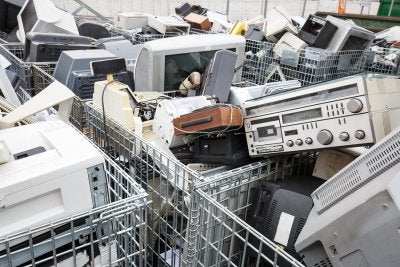
Mining
Materials like copper, platinum, gold, and iron are mined from the earth, refined, and then used to create a broad range of the electronics that people use every day. The process of refining raw materials produces greenhouse gas emissions and requires a significant amount of energy. For these reasons, recycling the materials used to make electronics conserves energy and benefits the environment.
Manufacturing
Next, the refined materials are used in the manufacturing of electronics. Some manufacturers also use recycled materials during this process. Then, the electronics are sold and used.
Purchasing
When purchasing electronics, it’s ideal to choose those that are designed with environmentally friendly features. Also, select those products that are made with durability, longevity, and recyclability in mind if you want to reduce your environmental impact.
Collecting
Ideally, all used electronics would be disposed of through a certified electronics recycler. This step can be done in a variety of ways. For example, electronics retailers and community centers often have e-waste recycling bins. Also, some companies offer warranty and mail-in programs that reward consumers for sending in their old devices. These used products can be refurbished or recycled, cutting down on the need for mining and processing new materials. Unfortunately, some used electronics are thrown in waste bins and disposed of in landfills. Once this happens, the valuable materials used to make the electronics cannot be recovered and recycled.
Recycling
Those electronics that do make it to an e-waste recycling facility are dismantled before being sorted into categories of valuable and recyclable materials, such as aluminum, gold, glass, and copper. Then, the materials return to the supply chain where they can be used to create new electronics and other products.
RECENT POSTS
categories
- Uncategorized
- Waste Management Atlanta
- Waste Disposal and Recycling
- Hazardous Waste Disposal
- Chemical waste removal
- solid waste removal
- R3 Program
- Sustainable Organizations
- Sustainable Waste Removal
- Commercial Waste Removal
- Materials Management Program
- Dumpster Rental
- Roll Off Dumpsters
- Construction Site Waste Removal
- Sustainability
- Recycling in Atlanta
- Industrial Recycling
- Industrial Waste Removal Services
- Southern Waste & Recycling
- Waste Removal Atlanta
- Waste Specialists
- Atlanta
- Infographic
- Front Load Dumpsters
- Rear Load Dumpsters
- Reusable Electronics
- Dump Truck Atlanta
- Recyclable Electronics
- Trash Compactors
- Recycling
- Recycling Program
- Office Recycling
- Metal Recycle
- Electronic Waste
